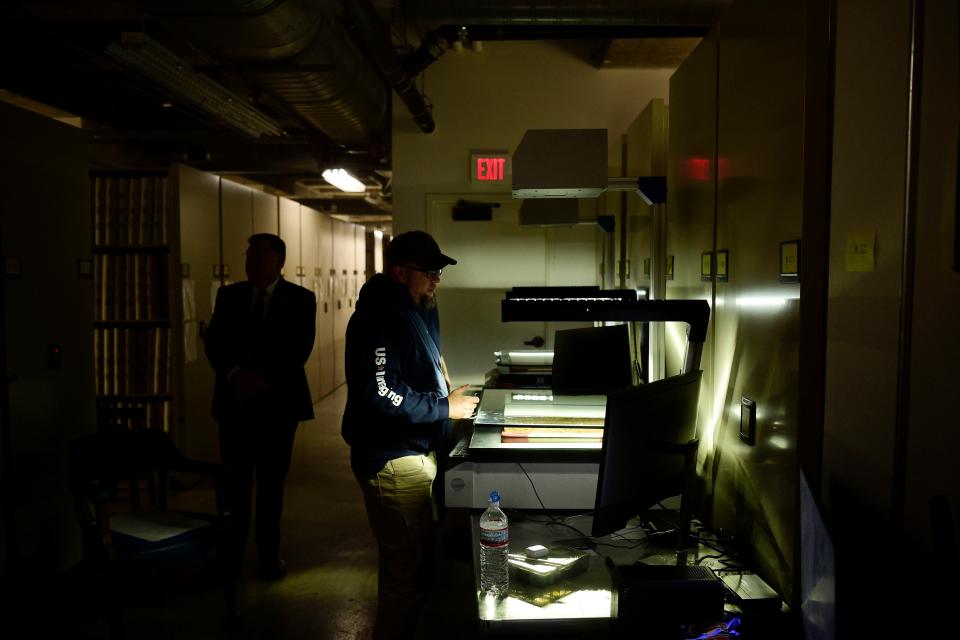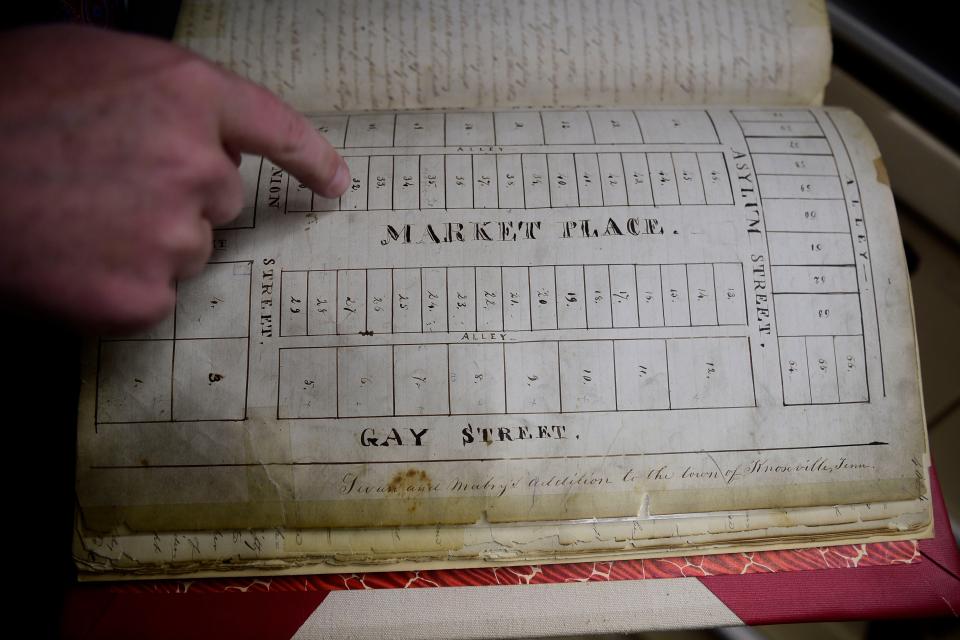Knox County's delicate property records, and the history tied to them, will soon be searchable online
Deep below Gay Street in the key-protected, climate-controlled basement of the East Tennessee History Center, a crew of four men have been hard at work with 12-hour shifts, seven days a week.
Since mid-November, two have been working every hour of the day save for a short Thanksgiving break.
They'll continue the work unabated until Dec.12 or so. But this isn't an extension of Santa's toy shop.
It's the process Knox County selected for digitizing hundreds of thousands of pages of precious, historical warranty deed books. When the work is done, anyone will be able to use their computer to search over 200 years' worth of property records.
Many of the handwritten books are ancient. The records go back to the 1750s, well before Tennessee was a state. Want to look at the original deed for Market Square? That would be the 1850s, book No. R-2, page 151. Want to see the family who originally owned the property where you rest your head every night? It'll be possible to find that with a click of a mouse.
“These records have tons of historical value,” Register of Deeds Nick McBride said as he began the tour for a reporter. “We start with North Carolina land grants before Tennessee was a state. Every piece of property in Knox County you can chase back to these records and bring them all the way back into North Carolina land grants.”
The records also, unsurprisingly, shows the darker sides of Knoxville’s history, including stories that are not uncommon in the South.
“You’ll see some things that are, of course, illegal today, where property was bought and sold for slaves ... but this is our history,” McBride said. “Restrictions on property are in here. Railroad deeds, so important in the 1800s, are in here.”
Gay Street: Why is a large crane in downtown Knoxville, and how long will Gay Street be closed?
Festive events: However you want to spend the holidays, something special awaits in downtown Knoxville
In the 1930s, as the country was in the midst of the Great Depression, municipalities across the country used federal funds to update their records. In Knox County, this meant taking old deed books that were unorganized and indexing them and putting them in alphabetical order for ease of use.

Because of that effort, many of the county’s oldest property records — the ones that data back to North Carolina land grants before Tennessee was a state — were rewritten. Even still, those books are nearly 90 years old and not accessible online.
Right now the county's archives are digitally searchable from 1968 to today. The work being done now will digitize everything else before that date. Digitizing the books will make complex searches simple, which will help title companies and those doing genealogy studies.
Downtown Knoxville: Budweiser Clydesdales coming to Knoxville for World's Fair anniversary kickoff
Real estate: Secret desk and slot machine among items up for auction before Villa Collina is demolished
To even get to this point is pretty lucky, since it's rare for counties to even have all their records, head archivist Eric Head said. Sevier County, for instance, had a courthouse fire in 1856 that destroyed all of its records. The Tennessee Secretary of State has an entire website dedicated to lost records, mostly due to fire.
In all, the Knox County Commission approved $360,000 for the contract with US Imaging, though that was an estimate but McBride now expects it to cost less because the final bill will be based on how many pages were copied.

This past week the crew finished at the History Center and have moved their operation to the City-County Building for the rest of the time. When they’re through, they will have scanned over 700,000 pages inside more than 1,000 warranty deed books. The images will be processed at the company’s headquarters in Saginaw, Michigan, and the county will receive a hard drive with all of the information. That will be uploaded to a third-party vendor the county uses for its records.
Until then, the four men, working in pairs, will continue scanning the books, page by page, on high resolution scanners they brought with them.
Tyler Whetstone is a Knox News politics reporter focusing on Knoxville and Knox County.
Connect with Tyler: Twitter | Email
Make our community, our society and our republic stronger by supporting robust local journalism. Subscribe online at knoxnews.com/subscribe.
This article originally appeared on Knoxville News Sentinel: Knox County's property records dating to the 1700s will soon be online

